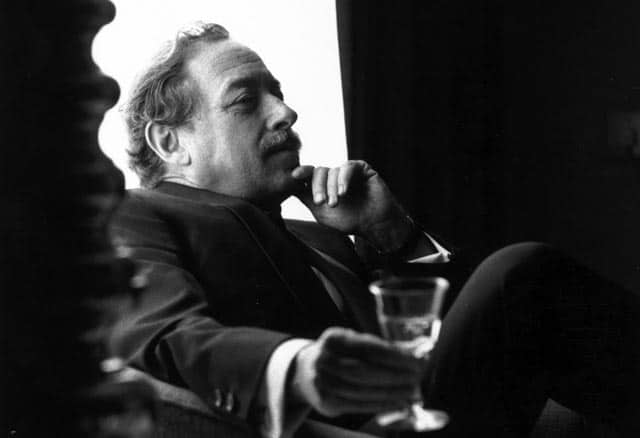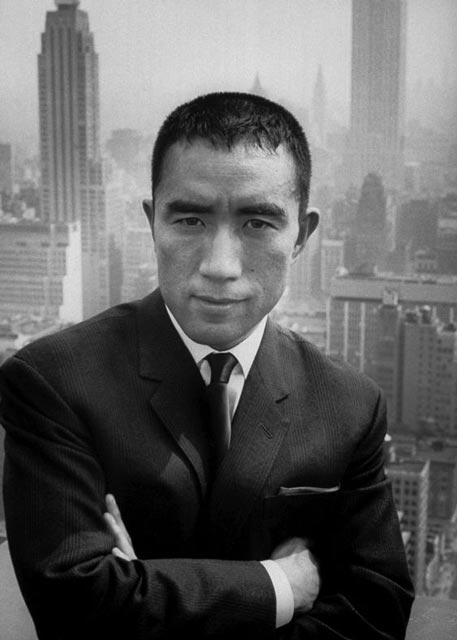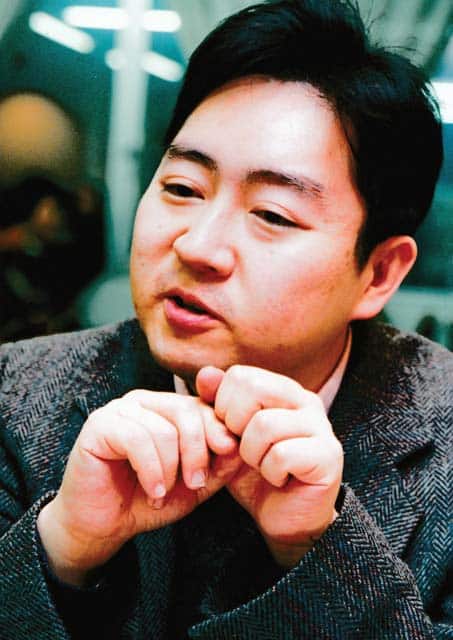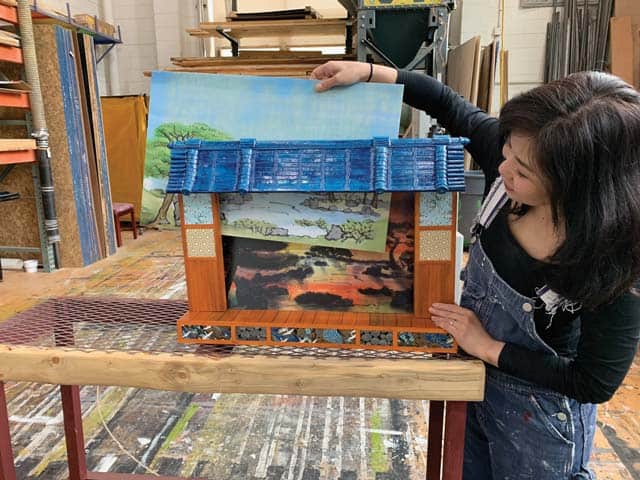by Rebecca M. Alvin
TOP IMAGE: Natsu Onoda Power with a kami-shibai set.
For 13 years now the Provincetown Tennessee Williams Theater Festival has presented its namesake’s work through a variety of lenses designed to continuously explore the depths of his work, its enduring and universal qualities, and to build for us a more complex picture of the great American playwright as more than simply the sum of the clichés about him.
For the 14th edition of the Festival, our attention is turned toward the influence of the equally complex Japanese writer and playwright Yukio Mishima and the theatrical traditions of Japan that influenced both playwrights.

An example of this year’s unique programming is the selection of two world premieres that perfectly reflect this theme of the influence of Japanese theatrical traditions: the world premiere of Mishima’s adaptation of the 400-year-old Japanese farce Busu (which will be performed on a double-bill with the traditional version as well), and the world premiere of Williams’ Japan-set The Lady from the Village of Falling Flowers, which will be directed by Natsu Onoda Power in the kami-shibai tradition. The play appears to have been written while Williams was a college student and has remained unpublished all this time (it’s believed it was written in 1935). It’s set in Japan a thousand years ago and centered on an emperor’s quest and is inspired by Lady Murasaki’s Tale of Genji.
“Kami-shibai is a Japanese storytelling form with illustrated paper placards,” Power explains. “It’s a street performance style, like a single narrator goes around in town on a bicycle and sets up a little stage and tells stories.”
Power will also lead a workshop on kami-shibai on Sunday. “Although it’s fairly standard and formulaic, I have adapted this form into different forms in my own work over the years, and I will introduce some of the techniques used to the participants,” says Power. “I’m calling it kind of kami-shibai for the 21st century. Kami-shibai is a pre-cinema independent form, but I’m adapting it for now.”
In addition to the workshop on kami-shibai, there are also workshops on two extremely important types of Japanese theater: kyugen and Noh. Noh theater is the Japanese classical drama form, while kyugen is comedic, however they developed over the centuries together and kyugen is often employed within Noh plays as a kind of comic intermission between Noh plays. The Noh workshop will be taught by Elizabeth Dowd, who has been studying Noh for decades and will have the world premiere of her American Noh play Gettysburg, at the University of Pittsburgh this month. The kyogen workshop is taught by Laurence R. Kominz, a Japanese drama scholar who has also directed several kyogen and kabuki plays in English.

Kabuki is another Japanese theatrical form that is perhaps better known because of its extravagant costuming and makeup elements. Mark Oshima, a kabuki researcher, translator, and singer, will lead a workshop on Saturday focusing on the techniques of kabuki, employed by both Mishima and Williams, to some extent.
Kabuki is an elaborate, musical form with highly stylized costuming, set design, and also dance components. It also requires a set of skills that many younger actors today do not possess. As a result, it is much harder to do productions of kabuki plays. Oshima says Mishima wrote 15 kabuki plays but only one, The Sardine Seller and the Nets of Love, has been produced regularly, because of these limitations. It’s also the only one produced in English.
The influence upon Williams is less discussed, in his fascinating essay in this year’s Festival program, David Kaplan explains how Williams incorporated both techniques and references to Japanese theater in his works, such as The Milk Train Doesn’t Stop Here, in which kabuki stagehands “establish the otherworldliness of that play as a fable and the fabulousness of its central role.”
Both Williams and Mishima dealt with complex, hidden, unexpressed human emotions in their work. “As it turns out, Tennessee Williams was a friend of Mishima’s from very early on,” says Oshima. In fact, there was a dialogue between them that Kaplan asked Oshima to translate, along with a text by Mishima about Williams. Those translations are in the current issue of The Gay and Lesbian Review.

“Tennessee Williams had this pose of being this sort of homespun, I dont know if you’d say ‘hick’ or a lush. Baut he was actually quite a bit of an intellectual, and so he had read a lot of Japanese literature in translation and had seen a lot of Japanese films,” Oshima adds.
Included Mishima plays in the program this year, aside from Busu, are The Black Lizard, The Lady Aoi, and The Lighthouse, which will have its English-language premiere here. The Williams plays selected for this year’s program, in addition to the aforementioned The Lady from the Village of Falling Flowers, are The Night of the Iguana, The Day on Which a Man Dies, and And Tell Sad Stories of the Deaths of Queens…
The Provincetown Tennessee Williams Theater Festival runs September 26 – 29, at various venues in Provincetown, with events and performances all day every day. For the full schedule, tickets, and information, visit twptown.org or call 866.789.TENN.











